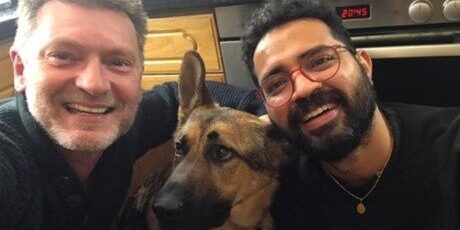We asked our male foster carers what they love about fostering and why positive male representation as carers is important to them.
David and Vinay, based in the north-west of England, shared the following with us:
Establishing males as caring and non-threatening when young people may have experienced the opposite of this
The sad fact is that some men abuse children, some women abuse children; that can be physical, sexual, emotional or neglect. The word ‘some’ is key here, it’s a minority, a very small minority. Of course, children we care for in our family who have experienced abuse, or witnessed it perpetrated on others, will very naturally be wary of us, as men; that is an entirely natural reaction. This is not something which can be overcome just by telling them we’re good people at the outset and expect to be believed, they’ve been let down many times before by the people who profess to love them. The only way to do it successfully is to demonstrate, through them seeing us living our lives day-in-day-out, that sort of behaviour will never be experienced by anyone in our household. It’s a long-term endeavour which goes hand-in-hand with the trauma they’ve sustained throughout their short lives so far. We just need to be the example of the many, many good parents out there who treat their children well.
Demonstrating that males can be sensitive, with the ability to show feelings and emotions. This could encourage male children to do the same
Children who have suffered traumatic experiences will have developed barriers as a defence mechanism; this can affect the depth of emotion they feel or display. We’re just normal guys, we’re both in touch with our emotions – any child living with us might be surprised at us, as men, because they may never have seen men display the emotions we (as men) display. We cry at a good film – and it’s not because we’re some sissy gay boys, we’re just men who don’t seek to supress our emotions. We hug to show our affection (if the individual child is comfortable with that) – because we recognise that appropriate touch can be a powerful form of comfort and reassurance, conveying warmth, care, and support. We emphasise being kind and respectful – possibly in situations where, in a different environment, they may have been encouraged to meet fire with fire; we discourage violence at all times and concentrate on the benefits of maintaining the higher ground in any disagreement they may have with others. Children in our family see, through our actions, that we walk the walk – and it’s not just meaningless words.
Breaking down gender role expectations such as household chores, food preparation, school runs and medical appointments
We’re two gay guys. We split the chores between us. Vinay does the cleaning and cooking; David does the laundry and dishes. We both do the school runs and medical appointments, depending on which of us is available. Depending on availability, we both take the children to family time and activities. Vinay tends to do bath time and bedtime stories with our youngest, but only because he has a closer relationship with him, whereas David is more active in other areas of the lives of the elder children. We are equal in maintaining boundaries, issuing any necessary sanctions, seeing through the consequences, or giving praise, showing respect for a job well done and giving rewards. We both give advice as necessary and will not shy away from sensitive areas – loss of a family member, matters relating to puberty, personal hygiene, etc. Vinay does the daily logs; David does the admin and tends to be the one attending meetings with the local authorities. If there is any preconceived view when they arrive in our family on whether a man or woman does a specific job, if you were to ask any of the children who have been with us long-term, we rather suspect that would not be recognised as such by them, Indeed we actively encourage their participation in a whole variety of chores (albeit their unwillingness to contribute is age appropriate, and carried out begrudgingly!).
Further promoting diversity and inclusion generally
We’re reasonably diverse – both gay and one of us is Asian. The fact we’re gay has never, we believe, been presented as an issue for any of the children we’ve had in our family. We know one, to his friends, refers to David as his Dad, even though his friends have visited our house and they are that age where they will be very curious as to the set up, but it doesn’t appear to have caused our lad (or them) any issue. Another of our lads (white, blond hair) has referred to Vinay as his “Daddy” to one of his teachers, Vinay (Asian) very clearly isn’t his father. The point we’re trying to make here is that one of the age groups of peers they will almost certainly know we’re gay, but it’s just not a big deal for either them or for our long-term almost-teen lad. Our younger lad, who is making out that someone who everyone else would be able to see is absolutely not his father, clearly doesn’t recognise the difference. Our hope is that whatever their background, whatever age they may come to us, the experience of children who become members of our family is such that they realise it doesn’t matter what your sex or sexuality is, your colour or religion, age or physical ability, we should all be valued, respected and treated equally. Those are the values we promote.

David & Vinay also did some myth-busting https://ukfostering.org.uk/being-gay-and-fostering/
If you would like to find out more about fostering, then please get in touch.
0345 222 0518 (local rate number)
[email protected]
